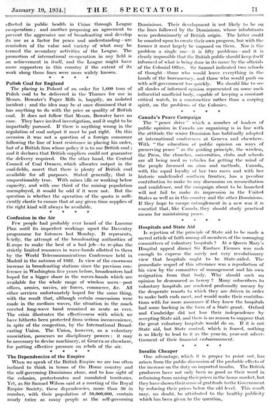Confusion in the Air Few people had probably ever heard
of the Lucerne Plan until its imperfect workings upset the Daventry programme for listeners last Monday. It represents, briefly, the attempt of the broadcasting authorities of E _trope to make the best of a bad job—to re-plan the strictly limited resources in wave-bands allotted to them by the World Telecommunications Conference held in Madrid in the autumn of 1932. In view of the enormous increase in broadcasting stations since the previous con- ference in Washington five years before, broadcasters had hoped for a bigger share in the waves-bands which are available for the whole range of wireless users—post offices, armies, navies, air forces, commerce, &c. All other services unfortunately hoped for the same thing, with the result that, although certain concessions were made in the medium waves, the situation in the much coveted long-wave band remained as acute as ever. The crisis illustrates the effectiveness with which we have hitherto been protected from serious inconvenience, in spite of the congestion, by the International Broad- casting Union. The Union, however, as a voluntary association, possesses no disciplinary powers ; it may be necessary to devise machinery, at Geneva or elsewhere, for putting effective pressure on rebels of the air.








































 Previous page
Previous page